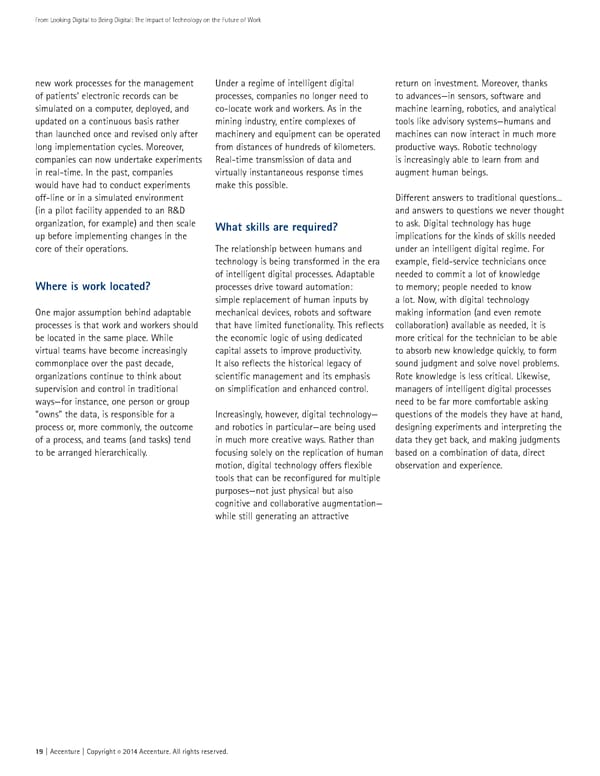From Looking Digital to Being Digital: The Impact of Technology on the Future of Work new work processes for the management Under a regime of intelligent digital return on investment. Moreover, thanks of patients’ electronic records can be processes, companies no longer need to to advances—in sensors, software and simulated on a computer, deployed, and co-locate work and workers. As in the machine learning, robotics, and analytical updated on a continuous basis rather mining industry, entire complexes of tools like advisory systems—humans and than launched once and revised only after machinery and equipment can be operated machines can now interact in much more long implementation cycles. Moreover, from distances of hundreds of kilometers. productive ways. Robotic technology companies can now undertake experiments Real-time transmission of data and is increasingly able to learn from and in real-time. In the past, companies virtually instantaneous response times augment human beings. would have had to conduct experiments make this possible. off-line or in a simulated environment Different answers to traditional questions... (in a pilot facility appended to an R&D and answers to questions we never thought organization, for example) and then scale What skills are required? to ask. Digital technology has huge up before implementing changes in the implications for the kinds of skills needed core of their operations. The relationship between humans and under an intelligent digital regime. For technology is being transformed in the era example, field-service technicians once of intelligent digital processes. Adaptable needed to commit a lot of knowledge Where is work located? processes drive toward automation: to memory; people needed to know simple replacement of human inputs by a lot. Now, with digital technology One major assumption behind adaptable mechanical devices, robots and software making information (and even remote processes is that work and workers should that have limited functionality. This reflects collaboration) available as needed, it is be located in the same place. While the economic logic of using dedicated more critical for the technician to be able virtual teams have become increasingly capital assets to improve productivity. to absorb new knowledge quickly, to form commonplace over the past decade, It also reflects the historical legacy of sound judgment and solve novel problems. organizations continue to think about scientific management and its emphasis Rote knowledge is less critical. Likewise, supervision and control in traditional on simplification and enhanced control. managers of intelligent digital processes ways—for instance, one person or group need to be far more comfortable asking “owns” the data, is responsible for a Increasingly, however, digital technology— questions of the models they have at hand, process or, more commonly, the outcome and robotics in particular—are being used designing experiments and interpreting the of a process, and teams (and tasks) tend in much more creative ways. Rather than data they get back, and making judgments to be arranged hierarchically. focusing solely on the replication of human based on a combination of data, direct motion, digital technology offers flexible observation and experience. tools that can be reconfigured for multiple purposes—not just physical but also cognitive and collaborative augmentation— while still generating an attractive 19 | Accenture | Copyright 2014 Accenture. All rights reserved. ©
 From Looking Digital to Being Digital Page 17 Page 19
From Looking Digital to Being Digital Page 17 Page 19